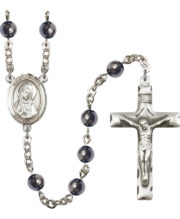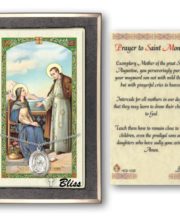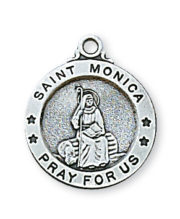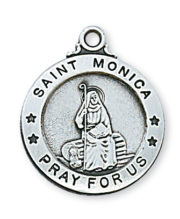Saints
St. Monica Biography – Patron Saint of Mothers and Wives
Model of Prayer in Domestic Difficulties
“All things whatsoever you shall ask when ye pray, believe that you shall receive and they shall come unto you.” (Mark, Ch. 11, v. 24.)
 St. Monica (332-387 AD) was a Christian saint and the mother of St. Augustine of Hippo. She is venerated as a saint by the Roman Catholic, Anglican and Eastern Orthodox Church. Her feast day is celebrated on August 27th.
St. Monica (332-387 AD) was a Christian saint and the mother of St. Augustine of Hippo. She is venerated as a saint by the Roman Catholic, Anglican and Eastern Orthodox Church. Her feast day is celebrated on August 27th.
St. Monica was born in Thagaste, a Roman town in what is now modern-day Algeria, in Africa. She was raised in a Christian family, but her husband Patricius, was a pagan and had a violent temper. Despite this, Monica persisted in her faith, and she raised her children to be Christians.
One of her children was Augustine, who would later become one of the most renowned theologians in Christianity. Monica’s relationship with Augustine was difficult at times, as he was a rebellious youth who lived a hedonistic lifestyle. Despite this, Monica never gave up on him and prayed tirelessly for his conversion.
Monica’s persistence and prayers were finally answered when Augustine converted to Christianity. This conversion was a significant moment for Augustine and for the Church. Monica’s devotion to her son and her faith in God’s ability to change him is a powerful testament to the power of prayer and the role of mothers in the spiritual lives of their children.
After Augustine’s conversion, Monica and her son traveled to Milan, where they met St. Ambrose, a bishop who would play a significant role in Augustine’s spiritual development. It was during this time that Monica experienced a profound conversion herself. She became known for her deep devotion and her deep love for God.
Monica died in Ostia, Italy, in 387 AD. Her death was a great loss for Augustine, who wrote about his mother in his Confessions, one of the most famous Christian texts. Her last words to Augustine were, “”Lay this body anywhere, let not care for it trouble you; this only I ask you, that you remember me at the altar of the Lord, wherever you be.””
After her death, Monica’s cult quickly spread and she was considered a saint by popular acclaim. Her relics are said to have been translated to a church in Rome, but in the 15th century, her body was moved to a church in Pavia, Italy, which was later renamed as the Church of Santa Monica, where her relics are still being venerated.
St. Monica is considered a model of patience, humility, and perseverance and her life serves as an inspiration for mothers and for all those who seek to deepen their faith in God. She is often invoked for those in need of patience and for those seeking the conversion of loved ones.
The Life of St. Monica
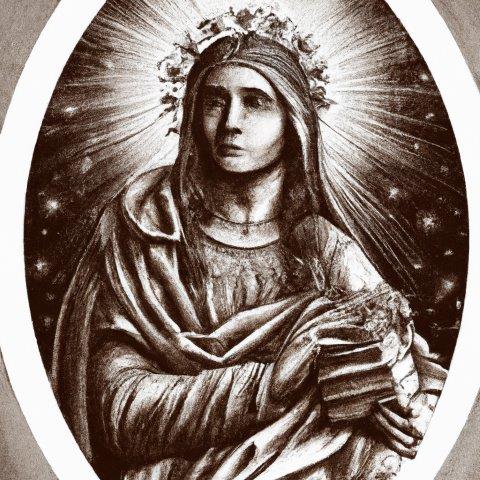 In the year 1850, at Notre Dame de Sion, in France, an association of Christian mothers was founded under the patronage of St. Monica. It had for its purpose mutual prayer for sons and husbands who had gone astray. At that time it spread over the entire Christian world from France to Dublin, even to Buenos Aires. St. Monica’s patronage was very well known during this time and still remains popular today. Saint Monica is the patron saint of mothers and wives who experience domestic problems. Saint Monica lived from 333-387.
In the year 1850, at Notre Dame de Sion, in France, an association of Christian mothers was founded under the patronage of St. Monica. It had for its purpose mutual prayer for sons and husbands who had gone astray. At that time it spread over the entire Christian world from France to Dublin, even to Buenos Aires. St. Monica’s patronage was very well known during this time and still remains popular today. Saint Monica is the patron saint of mothers and wives who experience domestic problems. Saint Monica lived from 333-387.
The homage paid to Saint Monica by women of every age is prompted by the personal Calvary she experienced for seventeen years of her life. She is the perfect example for the modern woman of perseverance in prayer, and next to the devotion of Jesus for Mary, and Mary for her Divine Son, perhaps no greater story of devoted maternal love can be found in the chronicles of Christian history than that of St. Monica and St. Augustine.
Biography of Saint Monica
Patron of those suffering the challenges of difficult marriages
St. Monica was born of Christian parents at Tagaste in Northern Africa, in the year 333. We are told little of her childhood or her early life, but we do know that her parents arranged a marriage for her with a pagan named Patritius who held some important civic position at Tagaste. Like an ordinary non-Christian of his time, Patritius was a man of dissolute habits, and Monica suffered a great deal from his temper and infidelity.
As a result of his vice and his outbursts of anger, St. Monica’s married life at the very outset was an unhappy one, especially in view of the fact that she had a miserable and possessive mother-in-law, with a disposition very much like that of her son, and a gift for interfering in their marital problems. She usually sided with her son, Patritius, in his outbursts of wrath, like some meddlesome mothers-in-law of our day and she was so jealous of Monica that she used to tell false stories to the servants about her. To Monica’s credit, however, she met all these insults from mother and son with a discreet silence that eventually won the respect of her husband. Still, St. Monica is no doubt the patron saint of difficult relationships.
Patron Saint of Troubled Parents

St. Monica and Patritius had two sons, Augustine and Navigius, and one daughter. St. Augustine was destined to be the center and the main cross of Monica’s life. Although it is with his eventual conversion that we usually associate the name of St. Monica, it should not be forgotten that she was instrumental as well in bringing about the conversion of her non-Christian husband. These were pagan times, and husbands for the most part, treated their wives like servants, and very often like slaves. Many of the wives of Tagaste would be amazed whenever they met Monica in the marketplace, to see that she bore no bruises from her husband, a bad habit to which they were quite accustomed. One day, when openly questioned about her good fortune, she replied: “Lay the blame rather on yourselves and your tongues. Guard your tongue when your husband is in a passion.”
Finally, after many years of prayer, which somewhat annoyed her husband, although he did hold her in some sort of reverence, Saint Monica succeeded in winning Patritius over to the Christian faith. He was baptized in 370, and from all reports became a chaste husband very attentive to his Christian duties. He died the year after his conversion. After his death, Monica resolved never to marry again. Through her patience and good example, she succeeded in converting her mother-in-law as well.
Because of her marriage with a pagan, it would appear that Saint Monica had been unable to secure the baptism of her three children. As an infant she had St. Augustine ranked among the catechumens, and she tried to instill in his youthful mind the principles of Christian piety. His one aim, however, was to excel in intellectual accomplishments.
Once, when Augustine fell ill, according to some reports, Monica pleaded with Patritius to allow his baptism, which he finally gave but withdrew after Augustine recovered. Whether or not this is true, the fact remains that his baptism was deferred. In this respect, St. Monica can certainly be invoked by the Catholic woman of today who finds herself facing this same problem in a mixed marriage where her non-Catholic husband refuses to honor the promises he made at the time of marriage. Her persistence and example which finally won, are certainly worthy of imitation.
St. Augistine’s Challenges
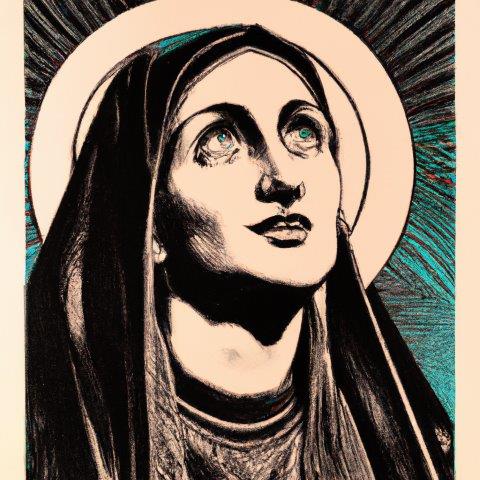 St. Augustine tells us, in his “Confessions ” that he was a wayward and lazy boy, and, we can suppose, the fourth century version of today’s juvenile delinquent. He had been sent to school at Madaura, and at this time, his mother’s anxiety became grave. After Patritius was converted, Augustine was sent to Carthage to continue his studies. When Patritius died in 371, St. Augustine was about seventeen years old and he remained at Carthage.
St. Augustine tells us, in his “Confessions ” that he was a wayward and lazy boy, and, we can suppose, the fourth century version of today’s juvenile delinquent. He had been sent to school at Madaura, and at this time, his mother’s anxiety became grave. After Patritius was converted, Augustine was sent to Carthage to continue his studies. When Patritius died in 371, St. Augustine was about seventeen years old and he remained at Carthage.
There, at Carthage, St. Augustine fell prey a heresy that suggested a crude division of good and evil, matter and spirit, in which God and Satan were constantly at war, a war, in which God could still be beaten. Augustine fell into this heresy in 373, and remained an adherent for the next nine years or so. In his own words, we learn that Augustine fell into serious sin, and although he does not furnish too many details, he lived a life of unbridled immorality. He cohabited with a woman who remained his mistress for some years, and they had a son whom he called Adeodatus.
When Augustine returned home, Monica drove him away from the family table and her home. All during this time, she was beset by the problem of trying to support Augustine, his mistress and their son, and this burden added insult to injury.
Many mothers today have to work and while supporting their children and family. There are unfortunately numerous instances where a child may grapple with deep problems, such as alcoholism and even involved in an illicit union as Augustine was so entangled in.
Later, however, St. Monica had a vision, which advised her generally to invite St. Augustine back into her life. She went to see a holy bishop and told him the whole story of her son’s defection and her own grief. He consoled her with the now famous words: “The child of those tears shall never perish.”
There is no sadder story in the fourth century Christianity than that of Saint Monica pursuing her son over the world. Monica pursued Augustine in Africa to Rome, where he had secretly fled, and where he was determined to teach rhetoric and again from Rome to Milan. Augustine was twenty-nine years old when he went to Rome. St. Monica, however, never ceased her praying, even during these journeys, when she must have attracted much attention with her long white veil and purple habit, symbols of her widowhood which she had worn since the time of her husband’s death.
In Milan, Monica had the good fortune of locating her son and also of meeting the great St. Ambrose who was bishop of Milan, and who was to have a profound influence on both their lives. Here in Milan, Augustine finally gave in to the grace of God, and was converted from his heresy and evil way of life. He was baptized on Easter Sunday in 387 with some of his friends and he continued to live with them.
Some time before this conversion, Monica had so influenced Augustine that she was instrumental in having his mistress and the mother of his son sent back to Africa, where she took the vow of celibacy. We never hear anything more of this woman who had devoted fourteen years of her life to Augustine. Monica and Augustine retained her son, Adeodatus, who was also baptized with Augustine. The boy died a year or two later in Italy. Although Monica had arranged a new licit union for her son, and this prior to his conversion, the girl whom she chose was too young, and since Augustine would have had to wait two years, he took another mistress. Finally he gave up this way of life and announced that he intended not to marry but to live a life wholly dedicated to the Church.
When St. Augustine entered the Church, he was about thirty-two years of age, and he was seventy six years old when he died, giving forty-four years of glorious service and inspired writing to the Catholic Church. Involuntarily he became a bichon and Hippo in northern Africa. His magnificent writings are not only outstanding treatises, but acclaimed as gems of literature and admired by people of every creed. Finally, after their happy days at Cassiacum and Augustine’s stirring conversion, they set out on their return journey to Africa. To the great grief of Augustine, however, Monica became sick on the way and died at Ostia in the year 387 at the age of fifty-four years.
Legacy of St. Monica
St. Monica lived in the fourth century, but the problems she solved by patience and prayer are still the problems encountered by women in our time. St. Monica’s domestic difficulty might be comparable to a parent who experiences unmanageable difficulty leading their family to Christ. For example, a mother could have a son who skips school, or joins a group of bad teenagers involved in crimes. It might be a daughter who is negligent about attending Mass or receiving the Sacraments. Last, but by no means least, it might be a cruel husband who drinks constantly, or a man with a foul mouth and a heavy hand, one who stays out all night and then boasts of his affairs with other women.
These domestic difficulties, which sadden the hearts of so many good Catholic parents of our day, were not foreign to St. Monica, or other saints like St. Rita of Cascia, who for years had to contend with a brutal husband and with two challenging sons. Their answer to these seemingly endless crosses in their lives was patient and persevering prayer, with a supreme confidence in that prayer. That prayer, for St. Monica and many other great saints, was a daily and determined habit, which not only placed full trust in Almighty God, but helped them maintain their mental stability in the grief they had to bear.
Coincidentally, in her youth, St. Monica started to become too fond of liquor, a fact that one of her biographers points out in some detail. It seems that in spite of the watchfulness on the part of her tutor, when Monica would be sent to the wine-cellar by her parents to draw wine for the use of the family, at first she would take the liquor out with a cup, then put this up to her lips and sip a little. We are told that each day she would add to this a little more, and developed a real inclination towards wine, so much so that she drank whole cups of it with pleasure as it came her way. Although it never reached any real excess, it was, nevertheless a very dangerous form of intemperance for a girl so young, and it was really becoming a habit.
One day, a servant girl who had been following Monica into the wine cellar, accused Monica of being a “wine-bibber”. This accusation apparently affected Saint Monica in such a way that she seriously examined herself and corrected the fault then and there.
Certainly this danger happening to a saint should be a warning to all people that such a habit can start very innocently and insidiously. Where Monica had the good sense to save herself, many people today can lose their morals when they seek the excessive use of liquor as an outlet for their family or emotional problems. It is very probable that if St. Monica had not cooperated with the grace of God, as so many courageous individuals do today through Alcoholics Anonymous and other valuable organizations, in later years her miserable mother-in-law, violent husband, and immoral son might have driven her to drink rather than to prayer and trust in God’s will.
When faced with a tragic problem at home, or in our personal lives, do we fall upon our knees, as St. Monica did in supplicating prayer, prayer that pounds against the walls of Heaven, in its volume and its repetition? Do we remember the words of Christ: “Ask and it shall be given unto you“? Christ never spoke idly. When we feel that we are just about at the end of our rope, with some excruciating dilemma, do we make a noose out of that rope, as Judas Iscariot did, and hang ourselves in spiritual despair, or do we make a knot in that rope, the strong knot of prayer, and hang on until God rescues us?
Rev. Thomas Verner Moore, a Carthusian monk, and an internationally recognized psychiatrist, in 1959, published a book entitled: “Heroic Sanctity and Insanity”. In the preface of that, he says: “Sanctity is most important in preventing mental breakdowns; but a reform of the moral and spiritual life can sometimes be an important factor in therapy.” Alcohol and excessive sedation of any kind are no solution to the problems of life, an illness, a wayward son, a drunken husband, financial losses, or unjust treatment by others, as St. Monica proved so well in her holy life.
Prayer is the therapy and the cure, prayer with perseverance; prayer in the morning and prayer in the evening; prayer with devotion and attention; prayer from the spirit and not from the lips alone: prayer with submission to the will of God; prayer of praise; prayer of thanksgiving; prayer of contrition; prayer of humility; prayer that seeks not the consolations of God, but the God of consolation 3; prayer that remembers always the soothing words of Christ: “Come unto me all you who labor and are burdened and I will refresh you.”
St. Monica, the remarkable prototype of per severance in prayer, especially for the Christian woman of our day, although removed from us by centuries is still very close to our world, a world that is rapidly losing faith. May women pray to this fourth century African saint, giving good example at all times, abounding in the grace of God, and think deeply on the words found in Sacred Scripture: “The Lord is far from the wicked, but He hears the prayers of the just.”
Why is St. Monica the Patron Saint of Mothers?
St. Monica is the Patron Saint of mothers and wives. Saint Monica was an exceptional role model who continued her strong faith in God through turbulent times with her family. For those mothers suffering from children losing their way, St. Monica is an inspirational saint to turn to.
Popular St. Monica Medal and St. Monica Rosary
Prayers to Saint Monica
Daily Prayer to St. Monica
O God, you are the comfort of those who mourn and the savior of all who trust in you. Blessed Monica’s loving tears moved you to convert her son, St. Augustine. May we also grieve for our sins and win the grace of your pardon through the intercession of these two saints. Through our Lord.
Intention Prayer to St. Monica
St. Monica,
troubled wife and mother,
many sorrows pierced your heart during your lifetime.
Yet, you never despaired or lost faith.
With confidence, persistence, and profound faith,
you prayed daily for the conversion
of your beloved husband, Patricius,
and your beloved son, Augustine;
your prayers were answered.
Grant me that same fortitude, patience,
and trust in the Lord.
Intercede for me, dear St. Monica,
that God may favorably hear my plea for(Mention your intention here.)
and grant me the grace to accept His Will in all things,
through Jesus Christ, our Lord,
in the unity of the Holy Spirit,
one God, forever and ever.Amen.
Prayer to St. Monica for Protecting Our Children
Great St. Monica, patroness of all fathers and mothers, please take our children, especially those who have turned from the ways of God and His Church, under thy protection. Let them always remain faithful to their baptismal vows. Give them the strength to walk always in the ways of the Lord, despite the temptations and false values they find in the world today.
Grant that they may share with thee the joys of eternal life. Amen.
Novena Prayer to St. Monica
Dear Saint Monica, you were once the mournful mother of a prodigal son. Your faithfulness to prayer brought you and your son so close to God that you are now with him in eternity. By your intercession and God’s grace, your son St. Augustine became a great and venerable Saint of the Church. Please take my request to God with the same fervor and persistence with which you prayed for your own son.
(Mention your intention here)
With your needs, worries and anxieties, you threw yourself on the mercy and providence of God. Through sorrow and pain, you constantly devoted yourself to God. Pray for me, that I might join you in such a deep faith in God’s goodness and mercy.
Above all, dear Saint Monica, pray for me, that I may, like your son, turn from my sin and become a great saint for the glory of God.
Amen.
Prayer of Thanksgiving to St. Monica
Good gentle, kind St. Monica, we turn to thee in grateful affection for thy powerful intercession on our behalf. We feel confident that through thy help, our dear Lord will grant our petitions in the way He knows is best for us and our children.
While we thank thee with heartfelt gratitude, we humbly beg thee to continue to intercede for our family in all our needs, spiritual and temporal, and inspire us always to accept God’s will in all things. Amen.
St. Monica: Patron Saint of Mothers and Widows
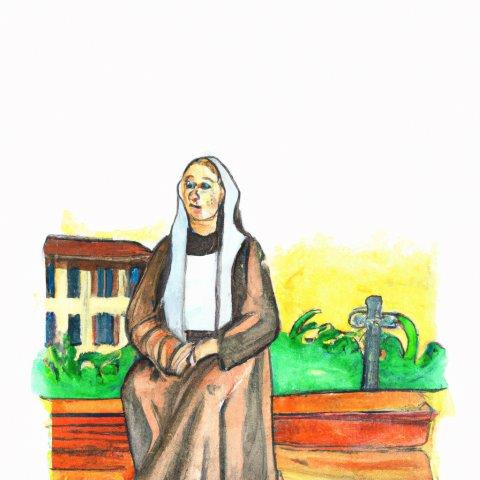 St. Monica is a much-loved saint who is venerated as the patroness of mothers and widows. She is remembered for her deep faith and her unwavering devotion to her son, St. Augustine, who eventually became one of the most influential figures in the history of Christianity.
St. Monica is a much-loved saint who is venerated as the patroness of mothers and widows. She is remembered for her deep faith and her unwavering devotion to her son, St. Augustine, who eventually became one of the most influential figures in the history of Christianity.
Patron Saint of Mothers
St. Monica is venerated as the patron saint of mothers due to her strong faith and her unwavering devotion to her son, St. Augustine. She is remembered for her tireless prayers and her love for her son, despite his many setbacks and difficulties. Mothers are called upon to seek her intercession and guidance, and to follow her example of perseverance, love, and faith in their own lives.
Patron Saint of Widows
St. Monica is also remembered as the patron saint of widows due to her status as a widow and her devotion to her son. She is seen as a model of faith and resilience for widows, who often face a difficult and uncertain future. St. Monica is therefore invoked by widows who seek her intercession and guidance, and who look to her for comfort and hope in their own lives.
In conclusion, St. Monica is a beloved saint who is associated with a variety of causes and causes. From mothers and widows to those who are seeking guidance and comfort, she is remembered for her deep faith, her unwavering devotion to her son, and her tireless prayers, and is therefore invoked by many people seeking her intercession and guidance.” “
Reflection on the feast day of St. Monica
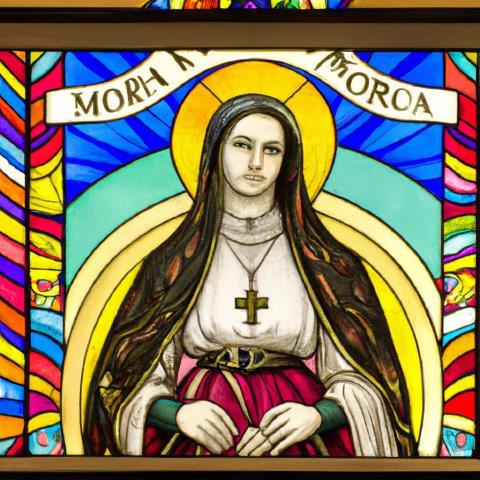 The feast day of St. Monica is celebrated on August 27th in the Roman Catholic Church.
The feast day of St. Monica is celebrated on August 27th in the Roman Catholic Church.
St. Monica is remembered for her strong faith, her unwavering devotion to God, and her deep love for her family. She was the mother of St. Augustine, one of the most influential figures in the history of Christianity. Despite her son’s wayward youth and his initial resistance to the Christian faith, Monica never gave up on him, but continued to pray and to hope for his conversion.
One of the most striking things about Monica’s story is her perseverance in the face of adversity. She faced many challenges in her life, including a difficult marriage and the waywardness of her son, but she never lost hope. Instead, she turned to God in prayer, trusting that He would bring good out of her trials. Her unwavering faith and her deep trust in God’s plan for her life is an inspiration to us all.
Another important aspect of St. Monica’s life is her devotion to her family. She loved her husband and her children deeply, and she worked tirelessly to guide them along the path of righteousness. She was a true example of a mother’s love and her devotion to her family serves as an inspiration for all mothers.
In conclusion, the feast day of St. Monica serves as a reminder of the power of prayer, the importance of perseverance in the face of adversity, and the deep love that a mother can have for her family. She is a powerful example of how, through faith and trust in God, we can overcome any obstacle and find peace and happiness in our lives. Let us all strive to follow her example and to pray for her intercession, that we too may have the strength and the faith to face the challenges that come our way.
Discover biographies, prayers, and reflections for more than 400 Catholic Saints
Saints Similar to St. Monica
You may also be interested in reading the Biography of St. Matilda. St. Monica, through her prayers and dedication to her son St. Augustine, displayed a sense of maternal devotion similar to the queenly virtues associated with St. Matilda. Next up: Biography of St. Nathanael
Also check out our handmade St. Monica Medal and St. Monica Rosary and St. Monica Rosary Bracelet.


